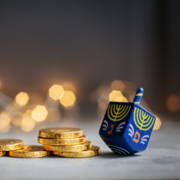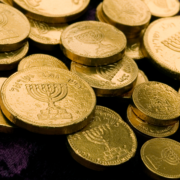Black Friday and Hanukkah: It’s Time to Fight Back!
As originally appeared in The Jerusalem Post on November 25, 2021.
“You may have heard of Black Friday and Cyber Monday. There’s another day you might want to know about: Giving Tuesday. The idea is pretty straightforward. On the Tuesday after Thanksgiving, shoppers take a break from their gift-buying and donate what they can to charity.” – Bill Gates
A few nights ago I was sent on a mission to find chocolate coins for my youngest daughter. I went from store to store and nothing. It wasn’t until I skeptically entered a convenience store with a big “We sell alcohol” sign that I hit the jackpot. Of all the stores, this was the one that had the edible coins; go figure.
I called my wife and told her that I feel that there was no excitement for Hanukkah. I was actually a bit depressed until I passed an English Cake bakery, and then the Hanukkah spirit came alive. Ah, sufganiyot. With all the various toppings and fillings. Just looking at them gave me a sugar high.
While on my quest for the chocolate coins I did pass a whole bunch of stores that had big “Black Friday” sale signs in their windows. The way the calendar falls out this year, it’s like the daily double. First Black Friday, then just hours, later the start of Hanukkah.
Due to its importance and a few requests I received from parenting coaches, I am going to repeat a theme that I write about every year and that’s how we should use Hanukkah to teach children about responsible money habits.
For the last month, we have been blitzed with Black Friday, Cyber Monday, and Hanukkah advertisements. We are urged to whip out our plastic and start shopping because, well, everything is on sale. Do you need the item? Can you afford it? Hey, it doesn’t matter; it’s a Black Friday doorbuster and you can always pay with debt!
The proximity of this global shopping spree with Hanukkah can serve as a reminder on how we must educate our children (maybe ourselves as well) with respect to money. Children are confronted with some very negative messages regarding money.
Spend money, buy things, and you will have happiness. We are continually sold the fantasy that more and more things bring bliss. But it just isn’t true. After all, how many of us have closets full of toys that our kids “needed to have” only to find them sitting covered in dust.
We need to fight back against this prevailing culture of fiscal irresponsibility and teach our children the proper role of money. I understand it’s not easy, after all from the government on down, spending money that one doesn’t have has become a global pastime.
Start teaching by using the message found in Hanukkah gelt (Yiddish for money, sometimes in the edible chocolate form).
What does it teach?
There are many opinions as to the reason of Hanukkah gelt. According to the Magen Avram (Polish rabbi 1633-1683), the custom of giving Hanukkah gelt enabled the poor to get the money needed to buy candles without feeling shame.
Why Hanukkah gelt?
I have another answer. The concept of giving Hanukkah gelt is conveyed in a passage in the Code of Jewish Law (Shulhan Aruch), where it states: “It is forbidden to derive any benefit from the lights of the Hanukkah menorah… even to use the light to count your money.”
We may ask why the phrase, “count your money,” is used here specifically. The reason for this is found within the word Hanukkah, which is the root of the Hebrew word chinuch, education. Hanukkah is a time when we celebrate the Jewish people prevailing over the Greek Hellenists, who sought the spiritual destruction of the Jewish people.
Today, this culture is based on consumerism and instant physical gratification, and it is as much of a threat to our existence today as Hellenism was to the Jewish people then. The symbol of this culture is money.
A child needs to know where money comes from. To a child, it seems as if money is always available. When their parents run out of money, they simply go to a small machine in the wall, punch in a few numbers and take out even more money. It’s magic.
The first thing to tell our children to do when they receive Hanukkah gelt is to give charity. Then, we should talk to them about saving. Ask your child what she would like to use her money for. If she wants to buy a PlayStation or a bicycle, explain that she should save up her money. Children need to understand that money is earned through honest hard work. With older children, long-term savings can be discussed. Money earned from babysitting or waiting tables can be invested.
We give Hanukkah gelt to educate our children in the importance of giving charity and doing good deeds. They need to learn that this money should be used for constructive purposes, and that the pursuit of money for its own sake is not the point of our existence. Rather, the reason why we have merited money is to use it for positive purposes that will benefit other people.
Teaching our children good money habits is a good way to beat back the forces of the modern day Hellenists and internalize the message of Hanukkah.
The information contained in this article reflects the opinion of the author and not necessarily the opinion of Portfolio Resources Group, Inc. or its affiliates.
Aaron Katsman is the author of Retirement GPS: How to Navigate Your Way to A Secure Financial Future with Global Investing (McGraw-Hill), and is a licensed financial professional both in the United States and Israel, and helps people who open investment accounts in the United States. Securities are offered through Portfolio Resources Group, Inc. (www.prginc.net). Member FINRA, SIPC, MSRB, SIFMA, FSI. For more information, call (02) 624-0995 visit www.aaronkatsman.com or email aaron@lighthousecapital.co.il.








